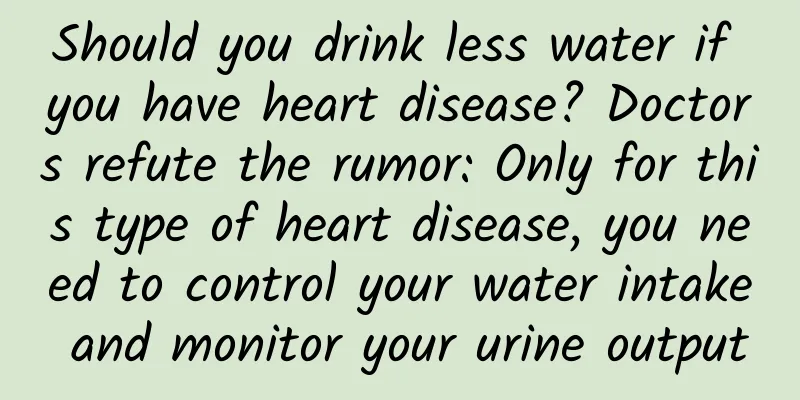Should you drink less water if you have heart disease? Doctors refute the rumor: Only for this type of heart disease, you need to control your water intake and monitor your urine output

|
When I often make rounds, I often meet various heart patients. Sometimes I ask more questions about patients with severe heart failure: how much water did you drink today, how much did you urinate, and even for more serious cases, I have to record the intake and output in detail, that is, how much you eat, drink, urinate and defecate. Sometimes people who don't have heart failure will ask: "Doctor, why don't you ask me how much I ate, drank, and urinated? Don't you take me seriously?" Actually, it’s not like that. Because not all heart diseases are related to how much you drink or how much you urinate. 1. There are many types of heart disease Heart disease is a broad concept, not the name of a disease. All diseases related to the heart can be called heart disease. The most common heart diseases include coronary heart disease mainly related to cardiovascular diseases, arrhythmias mainly related to heart beats, valvular heart disease related to heart valves, and cardiomyopathy related to the heart muscle. Specific coronary heart disease is divided into exertional angina, unstable angina, myocardial infarction, asymptomatic coronary heart disease, heart failure, etc.; arrhythmia is divided into rapid and chronic arrhythmia, rapid arrhythmia includes atrial fibrillation, atrial tachycardia, ventricular tachycardia, sinus tachycardia, ventricular fibrillation, etc.; chronic arrhythmia includes sick sinus, atrioventricular conduction block, sinus bradycardia, etc.; valvular heart disease includes primary, secondary, senile, rheumatic, etc.; cardiomyopathy is divided into alcoholic cardiomyopathy, ischemic cardiomyopathy, dilated cardiomyopathy, hypertrophic cardiomyopathy, etc. 2. Not all heart diseases focus on drinking water and urine volume For most heart diseases, such as coronary heart disease, arrhythmia, early cardiomyopathy, early valvular disease, etc., there is no need to pay attention to water intake and urine volume. Only when heart failure or heart failure occurs should you pay attention to the amount of water you drink and the amount of urine you drink. What is heart failure? Strictly speaking, heart failure is not the name of a heart disease, but a syndrome, which is the combined result of various heart diseases. Most heart diseases, if not treated actively and regularly, may develop into heart failure. For example, long-term uncontrolled high blood pressure can lead to heart enlargement and heart failure; For example, if coronary heart disease is not treated regularly, long-term ischemia can lead to heart enlargement and heart failure; For example, if the area of myocardial infarction is large, or if the patient seeks medical attention late and the blood vessels are not opened in time, it will lead to heart enlargement and heart failure; For example, various arrhythmias, if not controlled in time, can lead to heart enlargement and heart failure in the long term; For example, progressive valvular heart disease, various cardiomyopathies, etc. will develop into heart failure. Simply put, heart failure means that after the heart enlarges, its function fails and heart failure occurs. The most typical symptoms of heart failure are chest tightness, shortness of breath, difficulty breathing, lower limb edema, abdominal distension, etc. The five-year mortality rate for chronic heart failure is 50%, and the one-year mortality rate for severe heart failure is 50%. 4. Why should we pay attention to drinking water and urine volume in heart failure? One of the main reasons why heart failure causes chest tightness, shortness of breath, difficulty breathing, inability to lie flat to rest, lower limb edema, etc. is that there is too much water in the body. The total water intake is more than the water discharged, so naturally more and more water remains in the body. All this water needs to be metabolized by the heart, so it will increase the burden on the heart. The heart itself has already failed, and increasing the workload of the heart at this time will undoubtedly make the situation worse. More and more water will naturally induce worsening of heart failure. It may even induce acute heart failure and lead to death. Therefore, for patients with heart failure, especially severe heart failure, it is necessary to pay attention to the balance of intake and output, that is, the basic balance of eating, drinking, urinating, and sweat evaporation. Only balance can ensure the relative balance of water in the body, avoid suddenly increasing the burden on the heart, ensure heart stability, and not induce heart failure. 5. How to limit water intake and pay attention to urine volume The most accurate way is to weigh yourself, that is, weigh yourself every day to see if you have gained weight. If you have gained weight, it means that there is too much water in your body, and you need to increase the diuretic to excrete more, and drink less and reduce your intake. But it does not mean that people with heart failure should limit their water intake. At the very least, they should ensure that the body has the most basic life guarantee of water, rather than being afraid to drink. If the water intake cannot be guaranteed to be normal, new problems will arise. We just need not drink more water on purpose. Of course, everyone is not used to measuring weight. Simply put, it is to look at the urine volume. A small amount of urine means there is too much water in the body, so you need to add diuretics or reduce your water intake appropriately. If you find that your feet are swollen or your lower limbs are swollen, it means that there is too much water in your body and you must see a professional doctor to adjust your treatment. In short, only patients with heart failure need to pay special attention to drinking water and urine volume. At the same time, it is not necessary for patients with heart failure to drink less water. As long as they do not drink too much water, pay attention to measuring their weight, or observe their urine volume, it will be fine. |
<<: What is bread? How to eat bread before meals
>>: Nursing care for patients with Alzheimer's disease
Recommend
Can lobular hyperplasia of the breast become cancerous?
Lobular hyperplasia of the breast may lead to can...
Biochemical full set 40 items
Routine physical examinations are very useful. Bo...
How many days does it take for milk to swell after induced labor at four months?
Induced abortion is usually performed in the midd...
What causes sudden uterine cramps?
If a woman has inflammation of the uterus or uter...
Pharmacist's Antidote | Can the popular "oil-removing expert" orange help you lose weight?
Recently, a fast food brand launched a new produc...
Why do I have breast pain before my period?
Many women have some body signals before menstrua...
A woman dreams of her hand being bitten by a snake and bleeding
What does it mean to dream about a woman being bi...
Causes of vaginal bleeding in the elderly
There are many reasons for the appearance of post...
“Silent hypoxia” is all over the news! Is it necessary to buy a blood oximeter or oxygen concentrator? Can smart watches replace them?
Recently, products such as blood oximeters and ox...
Is ovarian follicle rupture with bleeding normal?
The rupture of the follicle and accompanied by bl...
Why do I have back pain and breast pain?
We all know that in life, many women will experie...
The right way to stop breastfeeding
Many babies find it very difficult to stop breast...
How long does it take for abdominal slimming pants to be effective?
Loving beauty is human nature. Some people use tu...
[Health Science] You fall asleep, but your body is busy
When people enter a sleeping state, consciousness...
Why does appetite decrease during late pregnancy?
Logically speaking, pregnant women have a very go...









